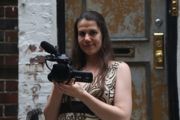Hidalgo, Alexandra
From DigitalRhetoricCollaborative
(New page: ==Biography== Alexandra Hidalgo is an assistant professor in the Department of Writing, Rhetoric, and American Cultures at Michigan State University. She teaches courses on professional w...) |
(→Work) |
||
| (One intermediate revision not shown.) | |||
| Line 1: | Line 1: | ||
==Biography== | ==Biography== | ||
| + | [[Image:AlexandraHidalgo.jpg|thumb|alt=Alexandra Hidalgo|Alexandra Hidalgo]] | ||
Alexandra Hidalgo is an assistant professor in the Department of Writing, Rhetoric, and American Cultures at Michigan State University. She teaches courses on professional writing, film and video, rhetoric, and composition.[http://alexandrahidalgo.com/about-2/] | Alexandra Hidalgo is an assistant professor in the Department of Writing, Rhetoric, and American Cultures at Michigan State University. She teaches courses on professional writing, film and video, rhetoric, and composition.[http://alexandrahidalgo.com/about-2/] | ||
| Line 17: | Line 18: | ||
Hidalgo cofounded and is editor-in-chief of agnès films, which she describes as “an online community of women and feminist filmmakers.” She is also multimedia editor of <i>Present Tense: A Journal of Rhetoric in Society</i>.[http://alexandrahidalgo.com/editorial/] | Hidalgo cofounded and is editor-in-chief of agnès films, which she describes as “an online community of women and feminist filmmakers.” She is also multimedia editor of <i>Present Tense: A Journal of Rhetoric in Society</i>.[http://alexandrahidalgo.com/editorial/] | ||
| - | She is the author and filmmaker of [http://ccdigitalpress.org/camara/intro.html <i>Camera Rhetorica: A Feminist Filmmaking Methodology for Rhetoric and Composition</i>], a video book developed first as an alphabetic dissertation at Purdue University with the guidance of [Sullivan, Patricia|Patricia Sullivan], to whom the project is dedicated.[http://ccdigitalpress.org/camara/acknowledgment.html] | + | She is the author and filmmaker of [http://ccdigitalpress.org/camara/intro.html <i>Camera Rhetorica: A Feminist Filmmaking Methodology for Rhetoric and Composition</i>], a video book developed first as an alphabetic dissertation at Purdue University with the guidance of [[Sullivan, Patricia|Patricia Sullivan]], to whom the project is dedicated.[http://ccdigitalpress.org/camara/acknowledgment.html] |
Current revision
Contents |
[edit] Biography
Alexandra Hidalgo is an assistant professor in the Department of Writing, Rhetoric, and American Cultures at Michigan State University. She teaches courses on professional writing, film and video, rhetoric, and composition.[1]
Her research is focused on filmmaking, race, and feminism.[2]
[edit] Personal Life
Hidalgo was born in Caracas, Venezuela. Her father, author and economist Miguel Hidalgo Briceño, mysteriously disappeared in the Venezuelan Amazon when she was six years old. As an adult, Hidalgo documented her search for her father in “Family Archives and the Rhetoric of Loss,” a video project included as a chapter in the web text Provocations: Reconstructing the Archive.
Hidalgo immigrated to the U.S. at age 16, leaving family behind in Venezuela.
She and her husband, Nathaniel Bowler, have two sons, William and Santiago.[3]
[edit] Education
Hidalgo holds a bachelor’s degree in philosophy from Ohio University, a master’s degree in creative writing from Naropa University, and a Ph.D. in English from Purdue University. She is fluent in English, Spanish, French, Russian, Portuguese, and Italian [4].
[edit] Work
Hidalgo cofounded and is editor-in-chief of agnès films, which she describes as “an online community of women and feminist filmmakers.” She is also multimedia editor of Present Tense: A Journal of Rhetoric in Society.[5]
She is the author and filmmaker of Camera Rhetorica: A Feminist Filmmaking Methodology for Rhetoric and Composition, a video book developed first as an alphabetic dissertation at Purdue University with the guidance of Patricia Sullivan, to whom the project is dedicated.[6]

